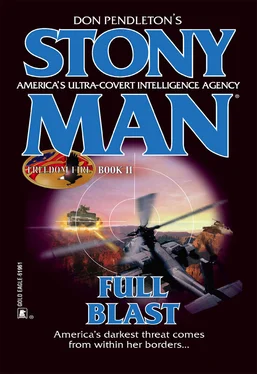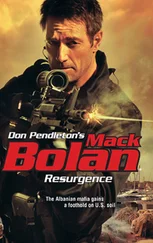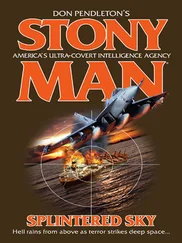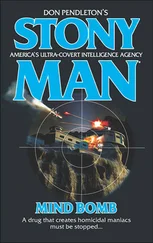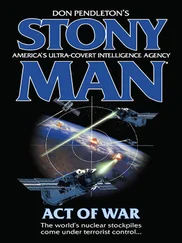Manning swung the Jeep in under the main wing, turning it so the vehicle stood sideways-on, providing a degree of cover.
Smoke was rising in thick columns from the holes in the weakened roof of the building they had just evacuated, and armed hardmen were starting to appear.
“Keep them busy,” McCarter yelled as he jumped from the Jeep and headed for the plane.
The side hatch of the Anatov An-26 was open and the Briton swung himself up into the body of the aircraft. He made his way along the aisle toward the cockpit and had almost reached it when the door swung open and the pilot charged through.
The Chinese was about McCarter’s height, broad and heavy. He slammed into the Briton, knocking himself back a couple of feet. The impact also sent McCarter crashing into the seats close to him. He fell back, losing his grip on the assault rifle as he sprawled across the seats. The pilot followed him, large hands reaching out to grab hold of his adversary’s throat. McCarter rolled off the seats, landing on his hands and knees. The pilot swung around and made another lunge at McCarter, bending over him. The Briton dropped, turned on his back and swung up his right foot. The sole of his boot caught the pilot under the chin, snapping his head back with enough force to break bone. The pilot let out a strangled yell.
McCarter, pushing upright and avoiding the pilot’s lunging blows, grabbed hold of the man’s thick black hair. He yanked the pilot off balance, then pulled the man’s head down, hard, onto his rising knee. The blow was brutal, caving in the front of the pilot’s face, shattering bone and splitting flesh. Dazed and in pain, blood streaming down his face, the pilot tried to hit back, but McCarter had neither the time nor the inclination to continue. He leaned in close, encircled the pilot’s neck with his right arm, and put on the pressure, twisting hard. He felt the neck snap. The Chinese went limp in his grip. The Phoenix Force leader let the man drop to the deck. Snatching up his rifle, McCarter pushed through the door into the cockpit. He dropped into the pilot’s seat and began the startup procedure.
MANNING HEARD the first of the plane’s twin turboprop engines start to turn, coughing as it spit out thick clouds of smoke from the exhaust vents.
“Doesn’t he love waiting till the last second,” the Canadian muttered.
“They don’t,” Encizo said.
He was watching the tight group of armed men moving in their direction. The North Koreans were carrying assault rifles, and they started to fire once they were in range. The first shots fell short. The following volley was closer, some of the slugs hitting the Jeep that Manning and Encizo were crouched behind.
As the plane’s second engine fired up, Manning fisted one of the grenades. He pulled the pin, exposed himself for a brief moment, and hurled the grenade in the direction of the advancing force. The moment it detonated, scattering the group, Encizo followed up with one of his own. The Phoenix Force pair went through their store of grenades, then dropped back behind the Jeep.
Four Koreans had been savaged by the grenade barrage, and another two were nursing wounds. As the sound of the final blast faded, the surviving Koreans began to regroup, opening fire again as they broke into a run.
McCarter slid open one of the cockpit windows and yelled over the rising roar of the engines, “Let’s move it, ladies!”
Manning and Encizo ran for the open hatch, hauling themselves inside. The An-26 was already moving, McCarter boosting the power with little regard to any strain he might be putting on the engines. It was to his advantage that the plane hadn’t been too long on the ground, the engines were still warm and less likely to stall. He worked the foot controls, using the rudder to swing the craft around in a circle so it was facing back the way it had come. Once the Briton had the plane set on the runway, he pushed the power up and felt the craft moving off. The entire airframe vibrated as the plane fought nature and the drag of the howling engines.
The Koreans opened up with their assault rifles, bullets peppering the fuselage, but none hitting anything vital to the performance of the aircraft.
Out the corner of his eye McCarter could see the heavy swell of the water bordering the edge of the runway. The wind was sending waves crashing against the craggy extremes of the rocky island. He could feel its grip on the aircraft as it picked up speed. Too slowly, he thought as it bounced and hopped its way along the makeshift strip. There was nothing he could do about the weather or the crude runway. It was all he had, that and the aircraft itself. McCarter coaxed and cursed and threatened the plane.
The end of the runway was coming so fast it was on McCarter almost before he knew it. He hauled back on the controls as the last few yards rushed toward him. The aircraft left the island behind, cruising only feet above the cold, dark waters of Korea Bay. McCarter’s arm muscles ached from his efforts to hold the controls back, fighting the drag of the air over the flaps. For a moment even the optimistic Briton imagined he was going to end up in the inhospitable waters.
The plane began to lift, gradually, seemingly with agonizing slowness. The black water started to sink below them and the straining engines settled to a steady beat. McCarter held the climb, then leveled off, letting the craft have its head.
“Close,” Manning said. “Too close.”
Standing behind McCarter during the takeoff, he had witnessed the near miss.
“That’s what you get for creeping up behind people,” the Phoenix Force leader said.
“Just to satisfy my curiosity, who is the guy back there?”
“The flight attendant. Pushy type.”
Manning dropped into the copilot’s seat, studying the bank of dials.
“Can you read these? Just asking because they’re all in Chinese.”
“Most of them.”
“How about this one?”
“Fuel. Why?”
“Because the gauge is in the three-quarters empty section.”
“Or a quarter full,” McCarter suggested.
“Where are we heading?”
“South Korea. Once we get over the border we should be on safe ground. When we land, I mean.”
Manning made a sound in his throat, stood and backed away. As he turned, he saw Encizo leaning against the bulkhead. The Cuban had a grin on his face that said he had heard the whole conversation.
“What did you make of that?”
“Nada,” Encizo said. “I am only a poor peasant, señor.”
“You’re as bad as he is.”
“Shouldn’t we try to contact someone on the South Korean side. Let them know who we are so they don’t shoot us down?”
“Good thinking, Rafe. Initiative like that could get you a field promotion.”
“Jesus, why don’t you two get married?”
“Out of the question,” McCarter said. “I’m British and he’s only a lowly peasant.”
“Sí, and I know my place.”
“And right now it’s working that radio, so get to it.”
Encizo took the copilot’s seat and pulled on a set of headphones. He picked up the hand mike and began to work his way through the frequencies on the radio.
Peering through the windshield, Manning checked out the coastline on their left.
“How the hell do we know when we’re over South Korean territory?”
“It’s the part that has electricity,” McCarter said cheerfully. “We’ll be able to see the lights.”
“Tell you what I can see,” the Canadian said.
“What?”
“That MiG-23 coming up starboard.”
McCarter checked it out. He watched as the drab-colored jet, showing North Korean markings, slid in alongside them, the pilot cutting his speed to match that of the turboprop An-26.
“You don’t figure he’s come to escort us to safety?”
Читать дальше
